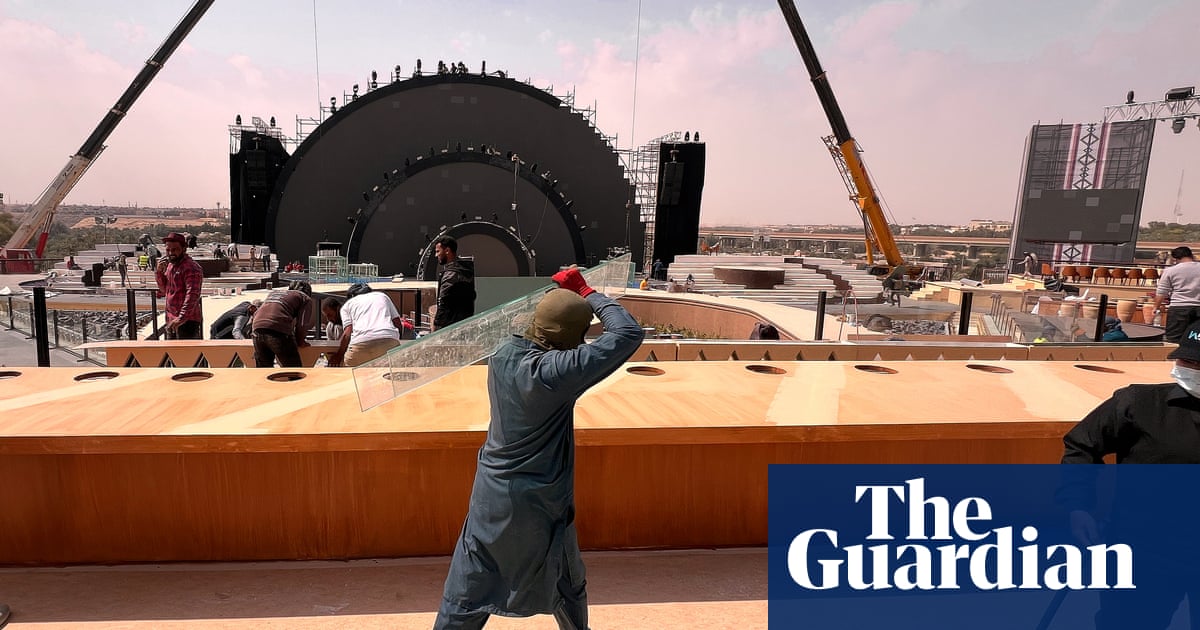Thousands of migrant workers are likely to die inSaudi Arabiaas a result of a building boom fuelled by the 2034 World Cup and other major construction projects, human rights groups have warned.
The Gulf kingdom has seen a surge in demand for cheap migrant labour, with asignificant increase in foreign workerssince 2021, as it starts preparations for hosting the World Cup and drives forward projects including thefuturist megacity Neom.
In two reports released today, human rights groups said workers face severe risks to life and have criticised the lack of transparency surrounding the deaths of migrant workers.
“Hundreds of thousands of young men … are being pitched into a labour system that poses a serious risk to their lives,” said James Lynch, a co-director of FairSquare, which has writtena report on the risks faced by workers.
“While Fifa praises Saudi Arabia to the rafters,” he said, “children in places likeNepalgrow up without their fathers and never even learn how they died.”
Ina separate report on migrant worker deathsin Saudi Arabia, Human Rights Watch (HRW) accused Fifa of “knowingly risking yet another tournament that will unnecessarily come at a grave human cost”.
Earlier this year the Guardianrevealed a worker from Pakistan fell to his deathwhile constructing a stadium for the World Cup in the eastern city of Al Khobar.
The HRW report documented a catalogue of deaths caused by “gruesome yet avoidable workplace-related accidents” in Saudi Arabia,including by decapitation, electrocution and falls from height, leaving the families of victims devastated and impoverished.
Under Saudi law, when a worker dies in the course of their jobtheir family members should receive compensationfrom a government insurance scheme or directly from the employer. However, HRW called the process “long and burdensome” and recorded numerous cases where families received little or no compensation.
The Saudi authorities have claimedthat the rates of work-related injuries and deaths have fallen significantly.
But rights groups such as FairSquare have raised concerns about, “serious shortcomings in the manner in which the authorities in Saudi Arabia investigate and certify migrant worker deaths”. Many deaths may be misclassified as “natural” when it is likely they are linked directly or indirectly to the working and living conditions faced by workers.
The term “natural” provides no meaningful explanation for the underlying cause of death, said FairSquare, whose report stated: “It appears that the Saudi authorities are using it as a shorthand for any deaths that did not result from workplace accidents, road traffic accidents or other violent deaths.”
That view is supported bya 2019 study by a Saudi pathologist, who examined all death certificates from a hospital in Riyadh between 1997 and 2016 and found that in every case the cause of death was “either incorrect or absent” and that in 75% of cases there was no cause of death provided at all.
In response to the Guardian’s request for comment, Fifa shared a letter it had sent to HRW in which it stated: “Fifa seeks to play its part in ensuring strong protections for workers employed by third parties in the construction of FifaWorld Cupsites. This work involves a close collaboration with its Saudi counterparts and engagements with relevant international labour organisations … we are convinced that measures implemented … can set a new standard for worker protection.”
The Ministry of Human Resources and Social Development in Saudi Arabia was approached for comment.
